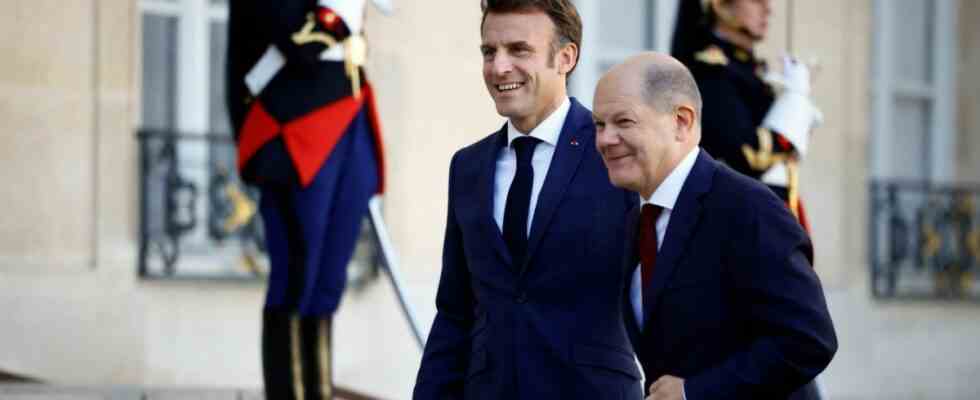It was intended to be a symbol of close partnership: in the middle of this week, the ministers of the governments in Paris and Berlin were actually scheduled to meet at Fontainebleau Palace, which is famous for its Renaissance art. The joint cabinet meetings have a long tradition and are intended to show how closely both countries work together. Due to too many controversial issues and allegedly also due to scheduling problems, the meeting was recently postponed – to next year.
In order to maintain a last semblance of unity, Chancellor Olaf Scholz traveled to Paris on Wednesday for a “working lunch” with President Emmanuel Macron. It lasted three hours, then both men met privately. The encounter was “very intense, very cooperative,” said the German side. There was “great agreement”.
However, this did not lead to a complete renaissance of the heavily strained Franco-German relations. So it was significant that, apart from a photo shoot, there was neither a press conference nor joint statements by the chancellor and president. It was pointed out that there was no joint appearance at a dinner by Scholz and Macron on October 3 in Berlin. Nevertheless, the German side would have welcomed such an appointment in Paris; both men could have demonstrated fundamental unity. Instead, there is, at least publicly, speechlessness in German-French relations. And in the background, on Wednesday, there was even renewed resentment on the French side because the federal government had initially announced a press conference between Scholz and Macron without discussing this with the French.
After all, there should be progress on one of the contentious issues: both sides have apparently cleared some obstacles in the joint Future Combat Air System (FCAS) armaments project. It is about a modern system for combat in the air, in which aircraft, drones and new weapon systems are coordinated with each other. The project, in which Spain is also involved in addition to Germany and France, has hardly got off the ground recently. The project had strained the relationship between the two countries for another reason: there was resentment in Paris that Scholz did not mention a word about the FCAS system in his Europe speech in Prague in August. It is politically and industrially important for France.
Recently, the growing tensions between Berlin and Paris had come to the fore. On the fringes of the most recent EU summit meeting in Brussels, Macron accused the German government of “isolating” itself in Europe. The German government spokesman Steffen Hebestreit said on the cancellation of the joint German-French Council of Ministers that there were differences on a “whole range of different issues”.
“Le Monde” wonders whether Macron misses the desired partner
Concern about the strained relationship is also growing in public. The newspaper Le Monde demanded on Wednesday that there must be a restart as a matter of urgency. “The visible differences between France and Germany come at the worst possible moment, as Vladimir Putin is testing European solidarity and Franco-German leadership in the 27-nation alliance is being called into question.” Obviously, Macron has not yet found the “desired partner” in Scholz that he once had in Chancellor Angela Merkel. Macron and Merkel were considered confidants.
Macron and Scholz seem to be less trusting: Paris reacted angrily that Scholz had not informed the Élysée Palace in advance about his planned 200 billion aid package. When Macron said in Brussels that it was not good for Germany to isolate itself, he also alluded to the displeasure of other governments. Poland’s Prime Minister Mateusz Morawiecki spoke of “German egoism”. The resentment was due to the fact that Germany wanted to develop a gas price cap for its own consumers, but rejected this at EU level. Scholz, in turn, rejected the allegations. “We are moving (…) within the framework of what others are doing in Europe,” he said.
In any case, after the meeting with Macron in Paris, Scholz tried to give the impression that the relationship with the French head of state was intact. “That was a very good and important conversation today,” he wrote on Twitter. “Germany and France are close together and are tackling the challenges together.”

